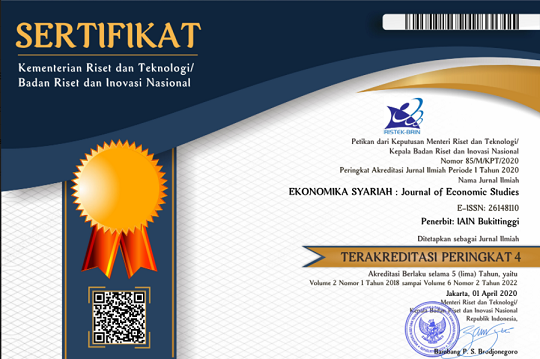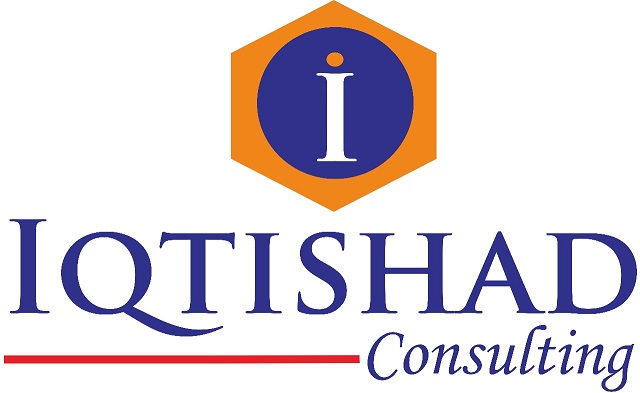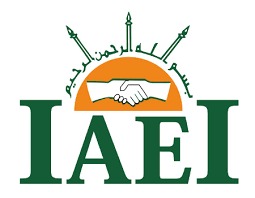The Role of Islamic Philanthropic Institutions in Accelerating the Halal Certification Program for Micro, Small and Medium Enterprises (MSMEs)
DOI:
https://doi.org/10.30983/es.v7i2.7600Keywords:
Islamic philanthropic, Halal certification, MSMEsAbstract
Lembaga filantropi mengupayakan pemberdayaan ekonomi bagi para mustahik, salah satunya dengan mendukung usaha mustahik. Penelitian ini bertujuan untuk menganalisis peran lembaga filantropi Islam dalam mempercepat program sertifikasi halal gratis pada sektor makanan dan minuman berskala mikro, kecil, dan menengah di Indonesia. Metode penelitian yang digunakan adalah penelitian kualitatif dengan deskriptif analisis melalui berbagai sumber sekunder seperti artikel penelitian, buku, laporan, website resmi dan sumber lain yang berkaitan dengan lembaga zakat dan wakaf serta sertifikasi halal bagi UMKM. Penelitian ini menunjukkan bahwa lembaga filantropi Islam seperti lembaga zakat dan wakaf di Indonesia memiliki peran signifikan terhadap percepatan program sertifikasi halal gratis (SEHATI) bagi UMKM. Hal ini karena UMKM sangat dekat dan sudah dibina langsung oleh lembaga filantropi Islam tersebut, sehingga tingkat kepercayaan untuk melakukan sertifikasi halal sudah terpenuhi. Lembaga filantropi Islam dapat menggerakkan sertifikasi halal melalui proses pendampingan yang dilakukan secara rutin melalui program pemberdayaan UMKM terutama bagi para mustahik.
Philanthropic institutions strive for economic empowerment for Mustahik, one of which is by supporting Mustahik businesses. This study aims to analyze the role of Islamic philanthropic institutions in accelerating the free halal certification programme in the micro, small, and medium-scale food and beverage sector in Indonesia. The research method used is qualitative research with descriptive analysis through various secondary sources such as research articles, books, reports, official websites, and other sources related to zakat and waqf institutions and halal certification for MSMEs. This research shows that Islamic philanthropic institutions such as zakat and waqf institutions in Indonesia have a significant role in accelerating the free halal certification programme (SEHATI) for MSMEs. This is because MSMEs are very close and have been directly fostered by the Islamic philanthropic institution, so the level of trust to carry out halal certification has been fulfilled. Islamic philanthropic institutions can promote halal certification through a mentoring process that is carried out routinely through MSME empowerment programmes, especially for mustahik.References
Adinugraha, H. H., Shulhoni, M., & Achmad, D. (2023). Islamic Social Finance in Indonesi: Opportunities, Challenges, and Its role in Empowering Society. Review of Islamic Social Finance and Entrepreneurship (RISFE), 2(1), 56–62.
Aliyudin, Abror, K., Khairuddin, & Hilabi, A. (2022). Sertifikasi Halal di MUI Lampung Pasca Undang-Undang Nomor 34 Tahun 2014 serta Problematika UMKM. Al Maal: Journal of Islamic Economics and Banking, 3(2), 194–212. https://doi.org/10.31000/almaal.v3i2.5459
Alwi, M., Ilham, M., & Amir, M. F. (2021). Islamic Philanthropy: The Idea of Economics Empowerment of the Ummah of K.H. Ma’ruf Amin. Fitrah: Jurnal Kajian Ilmu-Ilmu Keislaman, 7(1), 133–154. https://doi.org/http://dx.doi.org/10.24952/fitrah.v7i1.4094
Amal, M. K., Alhidayatullah, & Lestari, N. A. (2023). Optimasi Aspek Legal Sertifikasi Halal UMKM. JMM: Jurnal Masyarakat Mandiri, 7(5), 5079–5086. https://doi.org/10.31764/jmm.v7i5.17436
Arsil, P., Wicaksono, R., Hidayat, H. H., & Novitasari, D. (2022). Strategi Kerjasama Pengembangan Institusi Halal: Implementasi pada Halal Center. JIEI: Jurnal Ilmiah Ekonomi Islam, 8(1), 590–598. https://doi.org/http://dx.doi.org/10.29040/jiei.v8i1.3794
Charities Aid Foundation. (2022). World Giving Index 2022.
Choiri, M., & Ma’adi, A. S. (2023). Identifikasi Pemberdayaan dan Sertifikasi Halal pada UMKM oleh Lembaga Zakat di Bangkalan Madura. Al-Manhaj: Jurnal Hukum Dan Pranata Sosial Islam, 5(1), 787–796. https://doi.org/10.37680/almanhaj.v5i1.2289
Coordinating Ministry for Human Development and Cultural Affairs Indonesia. (2021). Pemerintah Dorong Peningkatan Produk Halal dan Pemberdayaan UMKM. https://www.kemenkopmk.go.id/pemerintah-dorong-peningkatan-produk-halal-dan-pemberdayaan-umkm
DinarStandard. (2022). State of the Global Islamic Economy Report: Unlocking Opportunity.
Fitri, R., Sudarmiatin, & Lia, D. A. Z. (2023). Urgency of Halal Certification on the Performance of MSMEs. Journal of Econpmics, Finance and Management Studies, 6(10), 4775–4792. https://doi.org/10.47191/jefms/v6-i10-12
Furqon, A. (2015). Manajemen Zakat. Walisongo Press.
Habibaty, D. M. (2017). Kompetisi Nazhir pada Wakaf Produktif Ditinjau dari Undang-Undang No 41 Tahun 2004 Tentang Wakaf. Al Awqaf, Jurnal Wakaf Dan Ekonomi Islam, 10(2), 154–161.
Hasri, B., Santoso, S., & Santosa, D. (2016). Analisis Pengembangan Usaha Mikro Kecil Menengah Untuk Meningkatkan Pertumbuhan Ekonomi Sebagai Upaya Pengentasan Kemiskinan dan Pengangguran Daerah di Kabupaten Ngawi. Jurnal Penelitian Pendidikan Guru Sekolah Dasar, 6, 128-.
Indah. (2022). Ini Syarat Daftar Sertifikasi Halal Gratis Kategori “Self Declare.†Kementerian Agama Republik Indonesia. https://kemenag.go.id/nasional/ini-syarat-daftar-sertifikasi-halal-gratis-kategori-quotself-declarequot-4b6skv
Jamilullah. (2023). Pelatihan Pendamping Proses Produk Halal untuk Lembaga Amil Zakat (LAZ). KNEKS. https://www.kneks.go.id/berita/559/pelatihan-pendamping-proses-produk-halal-untuk-lembaga-amil-zakat-laz?category=1
Khairunnisa, H., Lubis, D., & Hasanah, Q. (2020). Kenaikan Omzet UMKM Makanan dan Minuman di Kota Bogor Pasca Sertifikasi Halal. Al-Muzara’ah, 8(2), 109–127. https://doi.org/https://doi.org/10.29244/jam.8.2.109-127
Maesyaroh, Martiana, A., & Agustin, P. Della. (2022). Pendampingan Sertifikasi Halal UMKM melalui “Halal Self-Declareâ€: Studi di Aflaha Mart, Pleret Pondok Pesantren Muhammadiyah, Yogyakarta. MARTABE: Jurnal Pengabdian Masyarakat, 5(6), 2309–2318. https://doi.org/10.31604/jpn.v5i6.2309-2318
Ministry of Cooperatives and Small and Medium Enterprises of the Republic of Indonesia. (2021). Pengembangan Industri Halal Harus Sejalan dengan Kebijakan Pro UMKM. https://kemenkopukm.go.id/read/menkopukm-pengembangan-industri-halal-harus-sejalan-dengan-kebijakan-pro-umkm
Ministry of Religious Affairs Republic of Indonesia. (2022). Percepat Capaian Sertifikasi Halal Gratis, Kemenag Perkuat Kolaborasi Stakeholder. https://kemenag.go.id/nasional/percepat-capaian-sertifikasi-halal-gratis-kemenag-perkuat-kolaborasi-stakeholder-7jn9r6
Moerad, S. K., Wulandari, S. P., Chamid, M. S., Savitri, E. D., Rai, N. G. M., & Susilowati, E. (2021). Sosialisasi serta Pendampingan Sertifikasi Halal UMKM di Kabuapten Sidoarjo. SEWAGATI: Jurnal Pengabdian Kepada Masyarakat, 7(1), 11–25. https://doi.org/10.12962/26139960.v7i1.118
Murti, A. (2017). Peran Lembaga Filantropi Islam Dalam Proses Distribusi ZISWAF (Zakat, Infak, Sodaqoh, dan Wakaf) sebagai Pemberdayaan Ekonomi Umat. LABATILA: Jurnal Ilmu Ekonomi Islam, 1(1), 89–97.
Mustakim, Z., Setiawan, O., Chalim, A., & Maulana, M. R. (2022). Sosialisasi Sertifikasi Halal bagi UMKM di Kecamatan Sidayu Kabupaten Gresik. DedikasiMU: Journal of Community Service, 4(2), 221–226.
Nasution, A. H. (2021). Pengaturan Sertifikasi Halal Produk Usaha Mikro Kecil dan Menengah (UMKM) Studi Analisis Terhadap Undang-Undang No 33 Tahun 2014 tentang Jaminan Produk Halal. Universitas Islam Negeri Sumatera Utara.
Nurani, N., Nursjanti, F., & Munawar, F. (2020). Penyuluhan Sertifikasi Halal bagi UMKM Jawa Barat pada Situasi Pandemi Covid-19. Madaniya, 1(3), 126–139.
Pew Research Center. (2011). The Future of the Global Muslim Population Projections for 2010-2030. http://assets.pewresearch.org/wp-content/uploads/sites/11/2011/01/FutureGlobalMuslimPopulation-WebPDF-Feb10.pdf
Pujiyono, A., Setyowati, R., & Idris. (2018). Strategi Pengembangan UMKM Halal di Jawa Tengah dalam Menghadapi Persaingan Global. Indonesian Journal of Halal, 1(1), 1–8.
Rachma, N. C. A., & Hertati, D. (2022). Pendampingan Sertifikat Halal pada UMKM Sektor Kuliner di Kelurahan Penjaringansari Kecamatan Rungkut Kota Surabaya. ATDS Saintech: Journal of Engineering, 3(1), 89–96.
Sahroni, O., Suharsono, M., Setiawan, A., & Setiawan, A. (2018). Fikih Zakat Kontemporer (1st ed.). Rajawali Pers.
Sholikhah, N. A., Azam, S. A., Bestari, D. A., Huda, M. K., & Yunita, R. (2021). Peran Lembaga Filantropi untuk Kesejahteraan Masyarakat Global (Studi Kasus Pada Aksi Cepat Tanggap Madiun). Journal of Islamic Philanthropy and Disaster (JOIPAD), 1(1), 27–42. https://doi.org/10.21154/joipad.v1i1.3051
Supriyanto. (2006). Pemberdayaan Usaha Mikro, Kecil, dan Menengah (UMKM) Sebagai Salah Satu Upaya Penanggulangan Kemiskinan. Jurnal Ekonomi Dan Pendidikan, 3(1), 1–16.
Tanjung, H., & Devi, A. (2018). Metodologi Penelitian Ekonomi Islam (P. Oktavianawati (Ed.); 2nd ed.). Gramata Publishing.
Keputusan Kepala Badan Penyelenggara Jaminan Produk Halal Nomor 78 Tahun 2023 tentang Pedoman Sertifikasi Halal Makanan dan Minuman dengan Pengelolahan, (2023).
Undang-Undang Nomor 23 Tahun 2011 tentang Pengelolaan Zakat. (2011).
UNDESA. (2020). Micro-, Small and Medium-Sized Enterprises (MSMEs) and Their Role in Achieving the Sustainable Development Goal. https://sdgs.un.org/publications/micro-small-and-medium-sized-enterprises-msmes-and-their-role-achieving-sustainable
Yana. (2022). Mengejar Tenggat Mandatori Halal 2024. Halal MUI. https://halalmui.org/mengejar-tenggat-mandatori-halal-2024/
Yusuf, A. M. (2019). Metode penelitian kuantitaitf, kualitatif & penelitian gabungan. Prenadamedia Group.
Downloads
Published
How to Cite
Issue
Section
Citation Check
License
Copyright (c) 2023 Lu'liyatul Mutmainah, Elin Yulistiyani

This work is licensed under a Creative Commons Attribution-ShareAlike 4.0 International License.
Authors who publish with this journal agree to the following terms:
- Authors retain copyright and grant the journal right of first publication with the work simultaneously licensed under a Creative Commons Attribution-ShareAlike 4.0 International License that allows others to share the work with an acknowledgment of the work's authorship and initial publication in this journal.
- Authors are able to enter into separate, additional contractual arrangements for the non-exclusive distribution of the journal's published version of the work (e.g., post it to an institutional repository or publish it in a book), with an acknowledgment of its initial publication in this journal.
- Authors are permitted and encouraged to post their work online (e.g., in institutional repositories or on their website) prior to and during the submission process, as it can lead to productive exchanges, as well as earlier and greater citation of published work (See The Effect of Open Access).




